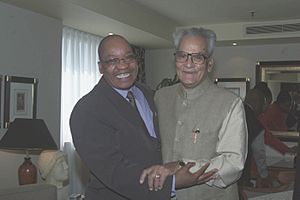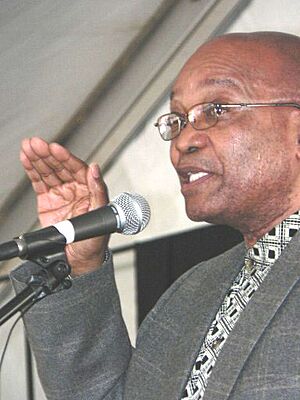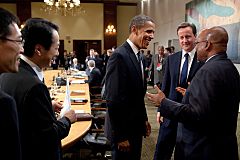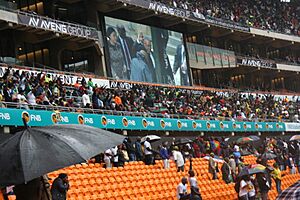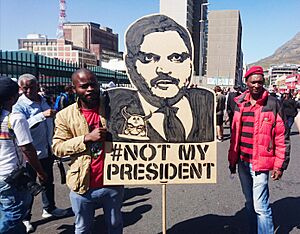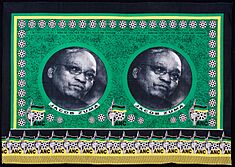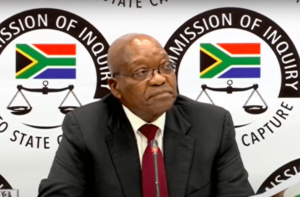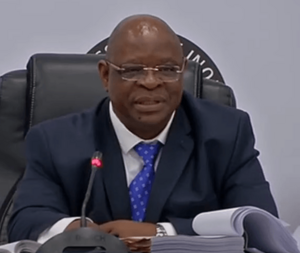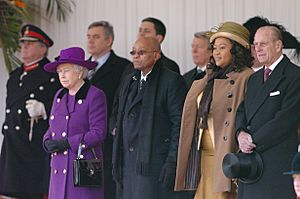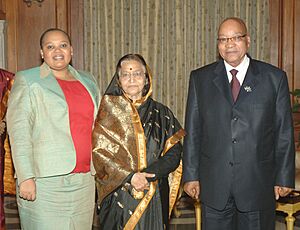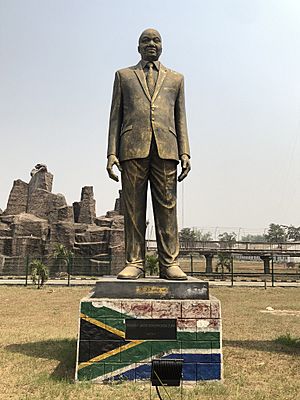Jacob Zuma facts for kids
Quick facts for kids
Jacob Zuma
|
|
|---|---|
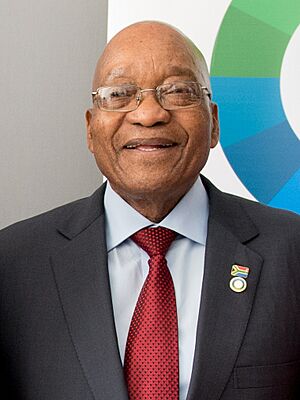
Zuma in 2017
|
|
| 4th President of South Africa | |
| In office 9 May 2009 – 14 February 2018 |
|
| Deputy |
|
| Preceded by | Kgalema Motlanthe |
| Succeeded by | Cyril Ramaphosa |
| 13th President of the African National Congress | |
| In office 18 December 2007 – 18 December 2017 |
|
| Deputy |
|
| Preceded by | Thabo Mbeki |
| Succeeded by | Cyril Ramaphosa |
| 3rd Deputy President of South Africa | |
| In office 14 June 1999 – 14 June 2005 |
|
| President | Thabo Mbeki |
| Preceded by | Thabo Mbeki |
| Succeeded by | Phumzile Mlambo-Ngcuka |
| 7th Deputy President of the African National Congress | |
| In office 20 December 1997 – 18 December 2007 |
|
| President | Thabo Mbeki |
| Preceded by | Thabo Mbeki |
| Succeeded by | Kgalema Motlanthe |
| National Chairperson of the African National Congress | |
| In office 20 December 1994 – 20 December 1997 |
|
| Preceded by | Thabo Mbeki |
| Succeeded by | Mosiuoa Lekota |
| Deputy Secretary-General of the African National Congress | |
| In office 7 July 1991 – 20 December 1994 |
|
| Preceded by | Position established |
| Succeeded by | Cheryl Carolus |
| President of uMkhonto weSizwe | |
| Assumed office 16 December 2023 |
|
| Deputy | John Hlophe |
| Preceded by | Party established |
| Personal details | |
| Born |
Jacob Gedleyihlekisa Zuma
12 April 1942 Nkandla, South Africa |
| Political party | uMkhonto weSizwe |
| Other political affiliations |
African National Congress (1959–2024) |
| Spouses |
Gertrude Khumalo
(m. 1973)Kate Mantsho
(m. 1976; died 2000)Nompumelelo Ntuli
(m. 2008)Thobeka Mabhija
(m. 2010)Gloria Ngema
(m. 2012) |
| Children | 20 (estimated), including Duduzile, Duduzane, Gugulethu, and Thuthukile |
| Occupation |
|
| Nicknames |
|
Jacob Gedleyihlekisa Zuma (born 12 April 1942) is a South African politician. He served as the fourth president of South Africa from 2009 to 2018. People also call him by his initials JZ or his clan names Nxamalala and Msholozi.
Zuma was an important activist against apartheid, which was a system of racial segregation. He was a member of uMkhonto weSizwe, the armed wing of the African National Congress (ANC). He also led the ANC as its president from 2007 to 2017.
Zuma was born in Nkandla, a rural area that is now part of the KwaZulu-Natal province. He joined the ANC when he was 17 years old in 1959. He spent ten years in Robben Island Prison as a political prisoner. After being released, he went into exile in 1975. He later became the head of the ANC's intelligence department.
When the ANC was allowed to operate again in 1990, Zuma quickly rose through the party's ranks. He became deputy secretary general in 1991, national chairperson in 1994, and deputy president in 1997. He served as the deputy president of South Africa from 1999 to 2005 under President Thabo Mbeki. Mbeki removed Zuma from his position in 2005 after a close associate was found guilty of making improper payments. Zuma faced legal challenges related to these payments. He was also cleared of other serious accusations in a highly publicised trial in 2006.
Despite these challenges, Zuma kept strong support within the ANC. This support helped him become the ANC president in December 2007. He was then elected president of South Africa in the 2009 general election and took office on 9 May.
During his time as president, Zuma started big projects like the National Infrastructure Plan. He also signed a deal for nuclear power with Russia, which was later stopped by a court. He focused on policies like "radical economic transformation." This included ideas like land expropriation without compensation and free higher education. In international relations, he worked to improve cooperation with countries in the Global South. South Africa joining the BRICS group was seen as a big success for him. He also received praise for his policies on HIV/AIDS.
Zuma's presidency faced many controversies, especially in his second term. In 2014, a public watchdog found that he had improperly benefited from state money used to upgrade his home. In 2016, the Constitutional Court ruled that Zuma had not upheld the Constitution. This led to calls for him to resign and an attempt to remove him from office. There were also many claims that a powerful family, the Gupta family, had too much influence over his government. This was called "state capture."
In December 2017, Cyril Ramaphosa was elected to replace Zuma as ANC president. The ANC then asked Zuma to resign as national president. After a vote of no confidence was planned in Parliament, Zuma resigned on 14 February 2018. Ramaphosa became president the next day.
After he resigned, legal challenges related to the 1999 Arms Deal were brought against Zuma again. He pleaded not guilty in May 2021. In June 2021, the Constitutional Court found Zuma in contempt of court for not following a court order. He was sentenced to 15 months in prison and was arrested in July 2021. However, he was released on medical parole two months later. This parole decision was later challenged and declared unlawful by a higher court. In August 2023, the Department of Correctional Services granted Zuma a remission of his sentence.
Contents
- Early Life and Background
- Anti-Apartheid Activism
- Rise to the Presidency
- President of South Africa (2009–2018)
- After the Presidency
- uMkhonto we Sizwe Political Party
- Jacob Zuma Foundation
- Personal Life
- Being King Mswati III's Father-in-Law
- Honours and Awards
- Filmography
- See also
Early Life and Background
Zuma was born in Nkandla, in what was then Natal Province. He moved around Natal and Durban as a child. His father, a policeman, died when Zuma was five. His mother was a domestic worker. His middle name, Gedleyihlekisa, means "one who smiles while causing you harm" in Zulu. He did not attend formal school.
He has several brothers and a sister. One of his brothers, Michael, was involved in a construction company. In 2011, Michael admitted to using Jacob's political status to get a government contract.
Anti-Apartheid Activism
Imprisonment and Exile
Zuma started fighting against apartheid at a young age. He joined the ANC in 1959. He became an active member of uMkhonto we Sizwe in 1962. That year, he was arrested and sentenced to ten years in prison. He served his time on Robben Island with Nelson Mandela and other ANC leaders. While in prison, Zuma was a referee for football games organised by the prisoners.
After his release in 1975, Zuma left South Africa. He lived in Swaziland and then Mozambique. He helped thousands of exiles who sought military training after the 1976 Soweto uprising. He became a full member of the ANC's National Executive Committee in 1977. He was forced to leave Mozambique in 1987 and moved to Zambia. There, he became head of the ANC's intelligence department.
Zuma was also a member of the South African Communist Party (SACP) from 1963 until 1990.
Return to South Africa
When the ANC was unbanned in February 1990, Zuma returned to South Africa. He was one of the first ANC leaders to come back for negotiations. Later that year, he was elected the ANC's Southern Natal Chairperson. As a Zulu, Zuma became known for helping to bring peace to Natal. This area was experiencing political violence between the ANC and the Inkatha Freedom Party (IFP). He also helped the ANC gain more support among the Zulu people.
In the 1994 general election, South Africa's first democratic election, Zuma was a candidate for the premier of KwaZulu-Natal. The ANC won the national elections, with Mandela becoming president. However, the IFP won KwaZulu-Natal. Zuma became a member of the executive council (MEC) for economic affairs and tourism in KwaZulu-Natal. In December 1994, he was elected national chairperson of the ANC.
Rise to the Presidency
Deputy President of South Africa
Zuma was elected deputy president of the ANC in December 1997. He was then appointed deputy president of South Africa in June 1999, serving under President Mbeki. Zuma played a key role in the Burundi peace process, working with Ugandan president Yoweri Museveni.
In 2002, the National Prosecuting Authority (NPA) began investigating Zuma for issues related to a large defence deal. In August 2003, the NPA said they had a case against Zuma but decided not to prosecute him at that time. This led to public arguments between Zuma's supporters and the NPA.
Mbeki and Zuma were both re-elected in 2004. However, on 14 June 2005, Mbeki removed Zuma from his position as deputy president. This happened after Zuma's associate, Schabir Shaik, was found guilty of making improper payments to Zuma. Mbeki stated that this decision was for the good of the country. Zuma also resigned as a member of Parliament.
His successor as deputy president was Phumzile Mlambo-Ngcuka. Her appointment was met with disapproval by some of Zuma's supporters at ANC rallies.
Legal Challenges and Popularity
After Zuma's dismissal, the NPA planned to bring formal charges against him. He received a provisional indictment in November 2005. However, the NPA was not ready for trial, and the case was eventually removed from the court roll in September 2006.
In December 2005, Zuma faced serious personal accusations. He was cleared of these accusations in May 2006 after a widely publicised trial.
Despite these legal issues, Zuma remained very popular, especially with the left-wing parts of the ANC and its allies. Many of his supporters believed that the legal challenges were part of a political plan against him. Zuma's court appearances drew large crowds of supporters. They would often sing the struggle song "Umshini wami" (meaning Bring Me My Machine Gun).
By October 2008, Zuma had been cleared of the personal accusations and the corruption charges were not active. However, the rivalry between Zuma and Mbeki continued.
Defamation Lawsuits
In 2006, Zuma and his supporters claimed that the media was trying to harm his political career. He filed several lawsuits against South African media outlets for publishing content that he felt damaged his public image. These included cartoons, comments, and parody pieces. Many of these lawsuits were later withdrawn or settled.
Becoming ANC President
By 2007, it was clear that Mbeki wanted to run for a third term as ANC president. However, Zuma gained strong support from most of the ANC's provincial branches. He became the favourite to win the party's presidency.
On 18 December 2007, at the ANC's conference in Polokwane, Limpopo, Zuma was elected ANC president. He defeated Mbeki with a significant number of votes.
Further Legal Challenges and Mbeki's Recall
Just over a week after the Polokwane conference, the NPA brought new charges against Zuma. These included charges of fraud, corruption, and money laundering. If convicted and imprisoned, he would not have been able to become national president. However, on 12 September 2008, these charges were declared unlawful due to a technicality. The judge also suggested that the charges might have been part of a political plan against Zuma.
Even though this ruling was later overturned, the ANC's new leadership, which supported Zuma, immediately asked Mbeki to resign as national president. Mbeki resigned to avoid a long dispute. He was replaced by Kgalema Motlanthe, who served as interim president while Zuma prepared for the 2009 election.
In January 2009, a higher court found that the charges against Zuma were not unlawful. However, the NPA formally withdrew the charges in the same week that Zuma became national president. This was due to new evidence suggesting improper conduct by prosecutors.
President of South Africa (2009–2018)
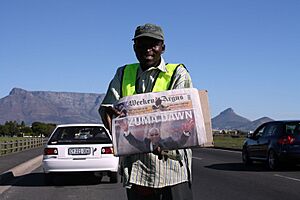
The ANC won the national election on 22 April 2009. Zuma was formally appointed by Parliament on 6 May and sworn in as president on 9 May 2009.
Declaring Financial Interests
As president, Zuma was required to declare his financial interests within 60 days. In March 2010, nine months after taking office, media reported that he had not done so. Opposition parties and a labour union urged him to disclose his interests. Zuma filed the disclosure later that week.
Domestic Policies
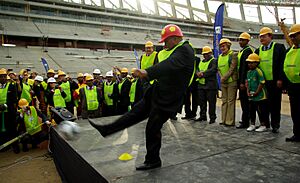
Economic Transformation
Zuma became president with support from a left-leaning group. From 2017, towards the end of his presidency, his policies became more focused on "radical economic transformation" (RET). Zuma announced this new focus in February 2017. He explained that RET meant changing how the economy was owned and controlled to benefit all South Africans, especially the poor. This policy was debated, with some critics saying it lacked real plans. Others claimed it was used to defend improper practices and the influence of the Gupta family.
Economic Reforms and Spending
Zuma took office during the 2008 financial crisis. He created the National Planning Commission to develop the National Development Plan. Other major projects included a programme for independent power producers and a large National Infrastructure Plan. Zuma supported expanding South Africa's nuclear power programme.
His government also tried to make some economic changes. These included increasing rules for private security companies and for oil, gas, and mineral resources. Zuma also proposed increasing black ownership requirements in mines. In 2017, he suggested introducing a national minimum wage.
Zuma focused on land reform during his second term. From 2017, he supported taking land without compensation. In December 2017, he announced that higher education would be free for students from lower-income families. This met a key demand of student protests.
South Africa's social welfare programmes grew under Zuma. He was also praised for his HIV/AIDS policy, which helped increase life expectancy. However, critics argued that his policies increased South Africa's national debt. Some estimates suggest that poor decisions and improper actions during his second term cost the economy billions of dollars.
Foreign Policy
Zuma's government focused on helping African and Global South countries develop. It also shifted towards closer ties with BRIC countries, especially China. In December 2010, South Africa officially joined the BRIC group, which then became BRICS. Zuma attended the group's third summit in China in 2011. South Africa's entry into BRICS was seen as a major diplomatic success for Zuma's government.
During South Africa's time on the United Nations Security Council, Zuma's government was criticised for changing its stance on certain foreign situations. For example, it voted for resolutions that allowed military action in Libya but then condemned the use of force by NATO.
Zimbabwe Relations
Zuma initially supported a quiet approach to Robert Mugabe's government in Zimbabwe. He believed that Mugabe was popular in Africa. However, by December 2007, Zuma became more critical of Zimbabwe's leadership. He spoke out against delays in the 2008 elections and said that the South African Development Community (SADC) should push Zimbabwean leaders to reach an agreement.
In 2010, Zuma called for international sanctions against Mugabe to be lifted. Despite some tensions, relations between South Africa and Zimbabwe remained friendly during Zuma's presidency.
International Criminal Court
In June 2015, South Africa hosted a summit attended by Sudanese president Omar al-Bashir. Al-Bashir was wanted by the International Criminal Court (ICC) for serious crimes. South Africa, as a signatory to the Rome Statute, was supposed to arrest him. However, South Africa granted him diplomatic immunity. When a court ordered his arrest, al-Bashir left the country. South Africa argued that the ICC unfairly targeted African leaders. In 2016, South Africa announced its intention to withdraw from the ICC.
Mandela's Memorial
On 5 December 2013, Zuma announced the death of Nelson Mandela. At Mandela's memorial on 10 December 2013, parts of the crowd booed Zuma loudly. This was linked to ongoing controversies and general dissatisfaction with his government. The ANC criticised those who booed, saying they embarrassed the country.
Re-election
Despite a campaign against him, Zuma was re-elected ANC president on 18 December 2012. He defeated Deputy President Kgalema Motlanthe. Although he had previously said he would prefer only one term as national president, Zuma became the ANC's candidate for the 2014 national election. The ANC kept its majority, and on 21 May 2014, Zuma was elected to a second term as president.
Nkandla Homestead Controversy
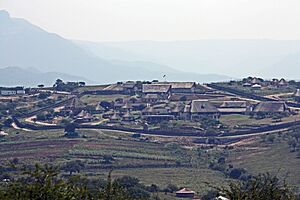
Zuma's second term began with ongoing debate about state money used for security upgrades at his private home in Nkandla. A public watchdog, Thuli Madonsela, investigated this. Her report, released in March 2014, found that some upgrades were not for security and recommended that Zuma repay the state.
Opposition parties took legal action to make Zuma follow these recommendations. On 31 March 2016, the Constitutional Court ruled that Madonsela's report was binding. The court also found that Zuma had failed to uphold the Constitution. Zuma apologised to the country after the ruling. This led to an attempt to remove him from office in Parliament, which was unsuccessful. However, Zuma faced strong criticism from many groups, including civil society and ANC veterans. He faced several more attempts to remove him from office.
State Capture Allegations
Zuma's close relationship with the Gupta family, who were known ANC donors, became a major source of concern. In April 2013, it was reported that the Guptas had landed a private plane at a military air base without proper permission. This brought their influence into public view. In March 2016, two ANC politicians claimed that the Guptas had offered them government positions. The Guptas and Zuma denied these claims.
Later, a former government official said that Zuma had asked him to help the Guptas. The Guptas then allegedly asked him to direct government advertising to their newspaper.
In March 2016, the public watchdog launched an investigation into "state capture." This report, released in November 2017, found evidence suggesting improper relationships between Zuma, other officials, and the Gupta family. It recommended that Zuma appoint a commission to investigate further. Zuma tried to overturn the report, but a court ordered him to appoint the commission. In January 2018, he established the Zondo Commission.
Cabinet Changes
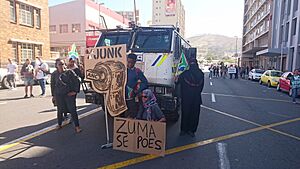
Zuma was criticised for frequently changing his cabinet ministers. During his time in office, he made twelve cabinet reshuffles. Some of these changes caused concern in financial markets. For example, when Finance Minister Nhlanhla Nene was replaced in December 2015, the public reaction was very negative. The new minister was replaced after only four days.
On 31 March 2017, another finance minister, Pravin Gordhan, was removed. This change was criticised by senior ANC leaders, including Deputy President Ramaphosa, and led to large protests across South Africa.
Succession and Resignation
Succession as ANC President
From 2015, it was believed that Zuma wanted his ex-wife, Nkosazana Dlamini-Zuma, to succeed him as ANC president. Critics worried that he would use this to keep control and avoid legal issues. She focused on economic transformation, while her challenger, Ramaphosa, focused on fighting improper actions. On 18 December 2017, Ramaphosa narrowly won the vote and became ANC president.
Resignation from Presidency
After Ramaphosa became ANC president, there was increasing pressure for Zuma to resign as national president. On 6 February 2018, Zuma's annual State of the Nation Address was postponed. The following week, Ramaphosa and Zuma held talks. On 12 December, the ANC's National Executive Committee decided that Zuma should be "recalled" (asked to resign) if he did not do so voluntarily. Zuma refused, asking for a three-month transition period.
On 14 February, police raided the Gupta family's home, related to the state capture investigation. The Speaker of Parliament announced that a motion of no confidence in Zuma would be voted on the next day. The ANC said it would support this motion. Zuma then gave a live television interview, saying he had done nothing wrong and was being "victimised." He said he disagreed with the ANC's decision.
Later that day, just before 11 p.m., Zuma announced his immediate resignation in a live televised address. He stated that he accepted the ANC's decision but wished they had given him reasons for his immediate departure. He said that no leader should stay longer than the people want them to. He also said that no lives should be lost or the ANC divided in his name.
After the Presidency
The week after his resignation, Zuma attended a farewell party hosted by Ramaphosa. Although former presidents are invited to all State of the Nation addresses, Zuma did not attend Ramaphosa's addresses in 2018, 2019, or 2020.
Legal Challenges Continue
On 16 March 2018, a month after Zuma resigned, the NPA announced that he would again face prosecution on 16 charges related to the 1999 Arms Deal. The case began in the Pietermaritzburg High Court. Zuma pleaded not guilty on 26 May 2021. As of July 2025, the trial is scheduled to continue in April 2025 after many appeals by Zuma.
Zondo Commission Testimony
In January 2018, Zuma established the Zondo Commission to investigate improper actions and state capture in the public sector. Zuma was scheduled to testify for five days in July 2019. On 15 July, he began his testimony by claiming the commission was part of a long-term plan to harm his reputation. He denied the truthfulness of other witnesses' statements. After three days, Zuma's lawyer announced that Zuma would "take no further part" in the proceedings. Zuma felt he was being treated like a criminal rather than a witness.
In the following months, Zuma seemed unwilling to cooperate with the commission. The commission issued orders for him to appear, but Zuma tried to have the chairperson, Ray Zondo, removed from the case. Zuma claimed they were friends and had family ties, which Zondo denied. Zondo dismissed Zuma's request. Zuma then left during a break and did not return.
Contempt of Court
In December 2020, the commission issued new orders for Zuma to appear. When he did not obey these orders, the commission asked the Constitutional Court to sentence Zuma for contempt of court. Zuma refused to participate in these proceedings. On 29 June 2021, he was sentenced to 15 months in prison.
Arrest and Release
Zuma was given until 4 July to surrender. His supporters gathered outside his home, threatening violence if he was arrested. Zuma told the media that he had been sentenced without a trial, which reminded him of the apartheid era. On 7 July, Zuma surrendered and was taken to the Estcourt Correctional Centre. On 9 July, a court dismissed his request to overturn the arrest. A severe outbreak of civil unrest occurred in KwaZulu-Natal on the same day, linked to Zuma's arrest.
On 22 July, Zuma was granted one day's leave to attend his brother's funeral. On 6 August, he was admitted to hospital for medical observation. He underwent surgery and remained hospitalised. On 5 September, he was released on medical parole to receive care at home.
This decision was challenged in court by several groups. On 15 December 2021, a high court judge set aside the parole decision, declaring it unlawful. The judge said it undermined respect for the law. Zuma was ordered to return to prison, and the time he spent on parole would not count towards his sentence. Zuma's lawyers announced their intention to appeal this decision.
The Department of Correctional Services declared that Zuma's sentence ended on 7 October 2022. On 21 November, the Supreme Court of Appeal ruled that the medical parole was unlawful. However, it allowed the Department of Correctional Services to decide if the time spent on parole would count towards his sentence. The Constitutional Court refused to hear a further appeal on 13 July 2023. On 11 August 2023, the Department of Correctional Services granted Zuma remission of his 15-month sentence.
uMkhonto we Sizwe Political Party
In December 2023, Zuma announced that he would not campaign for the ANC in the 2024 South African general election. Instead, he would vote for a new party called uMkhonto we Sizwe (MK Party). He said campaigning for the ANC would be a "betrayal." On 29 January 2024, Zuma was suspended from the ANC for supporting the MK Party. The ANC challenged the MK Party's registration, but a court dismissed their request.
In February 2024, another organisation, SANCO, expelled Zuma due to his absence from meetings. On 28 March 2024, Zuma was banned from running in the 2024 South African general election. This was because South African law does not allow convicted candidates to stand for public office. On 20 May 2024, the Constitutional Court of South Africa also barred Zuma from running for parliament.
After being a member of the ANC for over 45 years, Zuma was expelled from the party on 29 July 2024 for supporting a rival party.
Jacob Zuma Foundation
Zuma started a foundation to help children go to school and build homes for people in need. The former chairperson of the foundation, Dudu Myeni, resigned after being declared a "delinquent director" by a court in May 2020.
Personal Life
Zuma has been married multiple times, which is in line with traditional Zulu culture. He has many children. In an interview, he said he preferred to be open about his family life.
In March 2010, it was reported that the state budget for spousal support had increased. Zuma's spokesperson later clarified that the state did not fully support the President's wives or children, except for some travel and official event expenses.
Wives and Children
Zuma has been married six times.
- Gertrude Sizakele Khumalo: Married in 1973. They have no children together.
- Kate Mantsho: Married in 1976. She passed away in 2000. They had five children, including twins Duduzile and Duduzane.
- Nkosazana Dlamini: Married in 1982 and divorced in 1998. They had four children, including Gugulethu and Thuthukile.
- Nompumelelo Ntuli: Married in 2008. They have three children.
- Thobeka Stacie Mabhija: Married in 2010. They have three children.
- Gloria Bongekile Ngema: Married in 2012. They have one son.
Zuma has also been engaged to other women and has other children.
Being King Mswati III's Father-in-Law
In September 2024, Zuma's 21-year-old daughter, Nomcebo, became engaged to King Mswati III, the ruler of Eswatini. The engagement was announced after the annual reed dance ceremony. Nomcebo was presented as the "liphovela," which means a royal fiancée in Siswati. Nomcebo’s mother and Zuma were present at the ceremony.
Honours and Awards
Honours
| Year | Country | Order | |
|---|---|---|---|
| 2010 | Order of José Martí | ||
| 2010 | Knight Grand Cross of the Most Honourable Order of the Bath (GCB) | ||
| 2010 | Grand Commander of the Order of the Eagle of Zambia | ||
| 2016 | Grand Cross of the Order of the Republic of Serbia | ||
| 2016 | Collar of the Order of Abdulaziz Al Saud | ||
Awards
- Nelson Mandela Award for Outstanding Leadership from the Medical University of South Africa (1998).
- Honorary Knight Grand Cross of the Order of the Bath (2010).
- Imo Merit Award, the highest award in the Imo State of Nigeria (2017).
Statues
- Nigeria's Imo State unveiled a statue of Jacob Zuma on 15 October 2017.
Honorary Degrees
- University of Zululand (2001), Honorary Doctor of Administration.
- University of Fort Hare (2001), Honorary Doctor of Literature/Letters.
- Medical University of Southern Africa (2001), Honorary Doctor of Philosophy.
- University of Zambia (UNZA) Great East Campus (2009), Honorary Doctor of Law.
- Peking University (2012), Honorary Professor of International Relations.
Other Honours
- Zuma was given a chieftaincy title – that of the Ochiaga of Imo – during his trip to the kingdom of Eze Samuel Ohiri of Imo on 15 October 2017.
Filmography
- The Passion of Jacob Zuma, a 2009 French documentary.
- Motherland, a 2010 documentary.
- How to Steal a Country, a 2019 South African documentary.
See also
 In Spanish: Jacob Zuma para niños
In Spanish: Jacob Zuma para niños
- Presidency of Jacob Zuma
- Schabir Shaik trial
- Gupta family
 | Jewel Prestage |
 | Ella Baker |
 | Fannie Lou Hamer |


